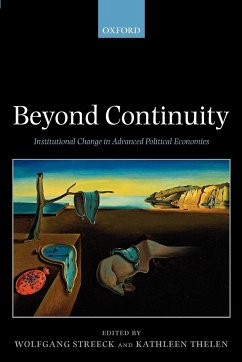
Institutional change in contemporary Russia
The activist-activist approach
Versandkostenfrei!
Versandfertig in 6-10 Tagen
52,99 €
inkl. MwSt.

PAYBACK Punkte
26 °P sammeln!
The author's analysis demonstrates a thorough erudition both in the history of sociology and in contemporary theories. The paper offers an analysis of classical sociology concepts, a sociological conceptualization of neo-institutional theory developed by economists, and an emphasis on the poly-paradigmatic or approach, to which the author's scientific position is consonant. The author's position is that the decisive role in changing social institutions belongs to actors, actors who, in response to changes in the environment in the process of interaction, produce new practices and rules, thereb...
The author's analysis demonstrates a thorough erudition both in the history of sociology and in contemporary theories. The paper offers an analysis of classical sociology concepts, a sociological conceptualization of neo-institutional theory developed by economists, and an emphasis on the poly-paradigmatic or approach, to which the author's scientific position is consonant. The author's position is that the decisive role in changing social institutions belongs to actors, actors who, in response to changes in the environment in the process of interaction, produce new practices and rules, thereby transforming the structure of institutions. The high relevance of the book and the serious validity of the ideas presented are beyond doubt. The problematic of institutionalism (the neo-institutional approach in particular), as well as the problem of the dependence of social changes on the historical path that has been traversed, are at the centre of contemporary discussions by philosophers, economists, sociologists, political scientists, cultural historians and historians. Written in a good literary language, this work will be useful to a wide range of specialists and students of social science.
The author's analysis demonstrates a thorough erudition both in the history of sociology and in contemporary theories. The paper offers an analysis of classical sociology concepts, a sociological conceptualization of neo-institutional theory developed by economists, and an emphasis on the poly-paradigmatic or approach, to which the author's scientific position is consonant. The author's position is that the decisive role in changing social institutions belongs to actors, actors who, in response to changes in the environment in the process of interaction, produce new practices and rules, thereby transforming the structure of institutions. The high relevance of the book and the serious validity of the ideas presented are beyond doubt. The problematic of institutionalism (the neo-institutional approach in particular), as well as the problem of the dependence of social changes on the historical path that has been traversed, are at the centre of contemporary discussions by philosophers, economists, sociologists, political scientists, cultural historians and historians. Written in a good literary language, this work will be useful to a wide range of specialists and students of social science.
The author's analysis demonstrates a thorough erudition both in the history of sociology and in contemporary theories. The paper offers an analysis of classical sociology concepts, a sociological conceptualization of neo-institutional theory developed by economists, and an emphasis on the poly-paradigmatic or approach, to which the author's scientific position is consonant. The author's position is that the decisive role in changing social institutions belongs to actors, actors who, in response to changes in the environment in the process of interaction, produce new practices and rules, thereby transforming the structure of institutions. The high relevance of the book and the serious validity of the ideas presented are beyond doubt. The problematic of institutionalism (the neo-institutional approach in particular), as well as the problem of the dependence of social changes on the historical path that has been traversed, are at the centre of contemporary discussions by philosophers, economists, sociologists, political scientists, cultural historians and historians. Written in a good literary language, this work will be useful to a wide range of specialists and students of social science.












